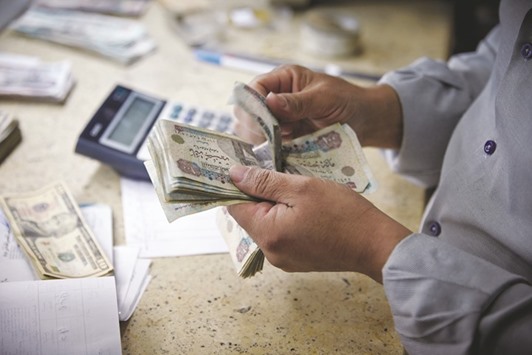The Egyptian pound has been weakening at a fast pace on the black market as hard currency demand rises in the dollar-starved economy, five traders and an importer told Reuters yesterday.
Egypt, which relies heavily on imports, has been facing a shortage of foreign currency since a popular uprising in 2011 drove away many tourists and foreign investors.
A black market for dollars has sucked up liquidity from the banking system and put a strain on the country’s foreign reserves, while the central bank had been keeping the pound artificially strong through weekly dollar auctions.
Reserves tumbled to $16.5bn in February from around $36bn before the uprising.
In an attempt to close the gap between official and black market rates which saw the pound weaken to almost 10 pounds per dollar last month, the central bank devalued the currency to 8.85 per dollar from 7.7301. Yesterday, however, it strengthened the currency to 8.78 per dollar while adopting a more flexible exchange-rate policy.
The central bank has also recently raised caps that were imposed in 2015 on dollar deposits and withdrawals for individuals, exporters under certain conditions, and some importers of essential goods. That allowed them to source some of their dollar needs from the black market.
Rates on the black market continued to climb at a fast pace on Tuesday and Wednesday, traders and importers told Reuters. Five traders said the price had climbed from 9.80 per dollar yesterday morning to a range of 9.85-9.90 by early afternoon. No volumes of trade were given.
That compares with a rate of around 9.7 quoted a day earlier. Traders and importers said that as demand for dollars increases the rate of the pound over the past two days has been changing by the hour.
An importer, who declined to be named, said he bought $20,000 from the black market on Tuesday but the rate changed within half an hour.
“There is a lot of confusion. Yesterday morning I was given the rate of 9.60 per dollar, but an hour later when I wanted to go ahead with the sale the price was raised to 9.65 per dollar and I had to buy because I was desperate,” he said.
A trader in the black market, who also declined to be named, said that while there is demand for dollars, some of it could be driven by speculators or others who are dollarising because they expect the US currency’s price to rise further.
“No one knows what is going on,” another trader said. “The price is continuing to rise amidst high demand and lower supply.”
An economist said the weakening of the Egyptian pound on the black market is a natural reaction to the central bank’s new policy stance.
“What is happening on the black market is natural given the lack of fresh funds entering the market after the central bank announced a more flexible exchange rate policy last week,” said Hany Genena, head of equities at Beltone Financial.

A man counts Egyptian pounds banknotes at a foreign currency exchange bureau in Cairo. A black market for dollars has sucked up liquidity from the banking system and put a strain on the country’s foreign reserves, while the central bank had been keeping the pound artificially strong through weekly dollar auctions.
